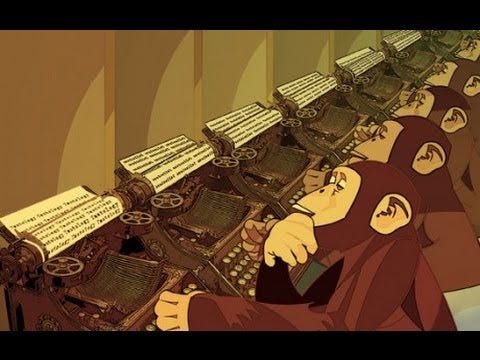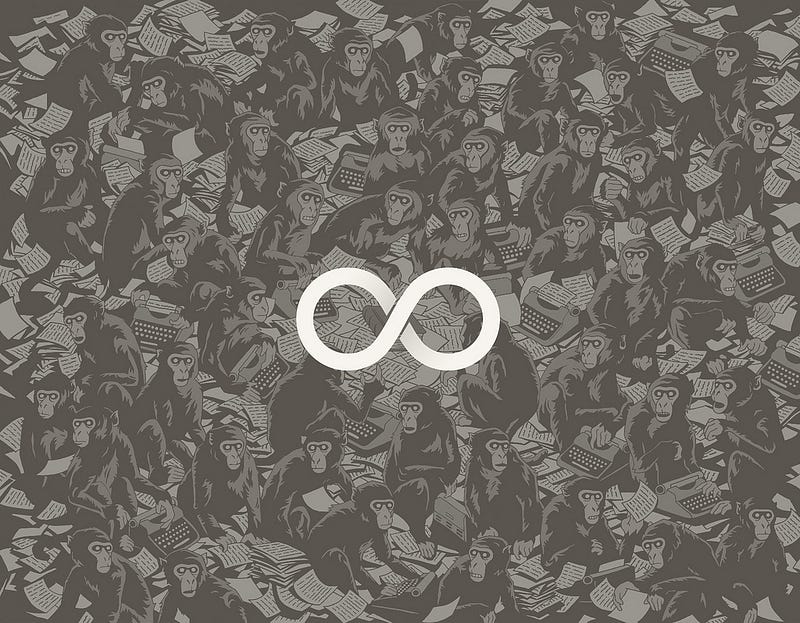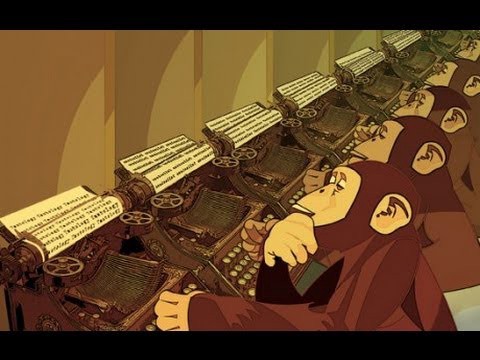There is a mistaken notion that an infinite number of monkeys, if given time and an infinite number of sturdy (monkey-resistant) typewriters, will come up with any number of historical texts.

Quite simply, this is false and is basically “rot”. It is a comment that demonstrates a true lack of awareness of numerical infinity. It excludes the range of an issue. For instance, there are an infinite number of separate non-integer values in the range of real numbers from 1.00… to 2.00… Although there are an infinite number of values in this mathematical range, there is no value that will or can ever equal 3.00. Nor will any ever be discovered. This is deductively provable based on the laws of algebraic mathematics.
The same applies to many other presumptions in life. This includes that of the monkeys and their proverbial writing devices. A monkey allowed to “bash” away at the typewriter does not ever hit the key sequencing required for the creation of a novel. It is not just an issue of rare events or the “black swan” problem; it is one of the mathematical range of the monkey’s actions.
In designing systems, there are always considerations around simplicity and use. Not all end cases are possible and in many instances, though it may seem that an infinite possibility allows anything, the reality is that it does not.
A QWERTY keyboard is not designed in a manner that will allow the monkey to construct grammatically valid constructs with any success. The frequency of spaces to other mashed characters is wrong, and the monkey falls into a pattern that never approaches discernible text, let alone a classic novel. In particular, the key distribution does not provide for a range of values that could ever create the desired outcome.
Rather than “bashing away” you need to have the monkey trained to select individual keys. This of course changes the nature of the process and increases the mathematical range. Even given an infinite value of some quantity, it does not mean that you have an infinite range of possible outcomes.

Welcome to how Bitcoin is secured. There are always an infinite number of collisions to any hash-puzzle solution, this is unavoidable in any probabilistic security system, but it is also not an issue. Firstly, many possible collisions will not be possible given the nature of a Bitcoin transaction (we will ignore the faults in P2SH for today) and next, even if they are, it is infeasible to discover these.
The nature of Bitcoin is also in use. Many keys are re-used, but this was not how Bitcoin was designed. In Core, they seem to revel in the fact that you collect a number of private keys, but the truth is, Bitcoin was designed to move from private key to private key with little or no reuse.
In time, our infinite monkeys may calculate any key, but if a key is not reused, this in itself would not matter. As you use a key, you move to a new address leaving the monkey to have to start calculating down its infinite path all over. As we have no method to create infinite storage, there is no way to map the keys used in Bitcoin.
As a side note, the format of a standard Bitcoin address means that there are address collisions. As there is a reduction of a 160-bit hash algorithm from a 256-bit hash and key length, we can expect to have many matching Bitcoin private keys for every publicly used address. The numbers… there are around 2^96 valid private keys per Bitcoin address.
That said, the chance of finding it is like finding a single grain of sand from all the sand on all the planets that we have found. So, it is not a scenario you need to worry about.


